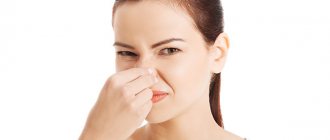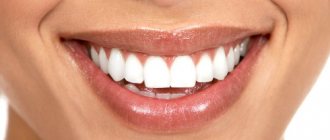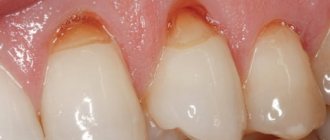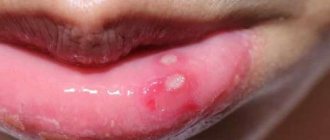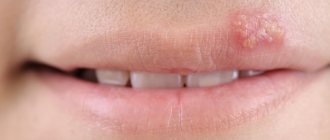Cheilitis is an isolated inflammatory process in the area of the mucous membrane, skin and red border of the lips. Outwardly it looks like swelling with redness and peeling of tissue. It can be an independent disease or a symptomatic manifestation of other pathologies. Sooner or later, almost every person encounters it, but at a young age the disease is noticeably milder, recurs less often and has no complications. In older people, due to a weakened immune system, periodic relapses of cheilitis can cause malignant tissue degeneration.
Causes
Cheilitis is a polymorphic and multifactorial disease that can be triggered by infections, physical and chemical environmental factors, as well as internal characteristics of the body. Among them:
- constant exposure to the open air - inflammation and peeling of the lips occurs when chapped by hot or cold air, excessive insolation;
- the presence of chronic diseases with skin manifestations of symptoms - various types of dermatitis, psoriasis, lupus erythematosus, lichen planus, syphilis, etc.;
- allergic reactions of the body - mainly with food allergies;
- tissue irritation from regular exposure to chemicals, including medications (for example, nasal drops);
- various neurological disorders, severe stressful situations, depression, constant anxiety;
- endocrine abnormalities - primarily hyperfunction of the thyroid gland, diabetes mellitus.
Main causes of the problem
If your lips are peeling, it is important to find out the reasons for this condition. This will affect the further outcome of treatment. The key reasons for peeling skin on the mucous membrane of the upper or lower lip in children and adults are:
- Avitaminosis. This reason most often affects the peeling of the mucous membrane in winter and spring.
- Development of an allergic reaction.
- Infectious processes in the oral cavity.
- Unfavorable climatic conditions. If the mucous membrane in the oral cavity peels off, the cause of this problem may lie in the effects of wind and cold air on the sensitive epidermis in the lip area. This factor also includes increased water hardness, which negatively affects the condition of the mucous membrane in children and adults.
- Diseases of internal organs. Such ailments include: diabetes mellitus, pathological processes in the oral cavity, herpes.
- Bad habits - smoking, constant licking of lips, excessive coffee consumption.
- Dehydration of the body. Sometimes the mucous membrane may suffer from a lack of fluid in the body.
Before carrying out any treatment, it is important to find out why the problem appeared, and then improve the appearance of the lips with the help of certain measures.
Types of cheilitis
Manifestations of cheilitis may vary depending on the type and cause of the disease. There are:
- Exfoliative cheilitis - manifested by peeling of the red border of the lips, with rare areas of burning and dryness of the lips themselves.
- Exudative cheilitis - symptoms of the disease are supplemented by swelling and severe pain. The skin in inflamed areas may become covered with baked crusts, which greatly complicate the patient’s life.
- The glandular form affects the minor salivary glands. Their congenital or acquired proliferation is observed, followed by infection with bacteria. In this case, the source of infection can be caries, periodontitis or banal plaque. Outwardly it manifests itself as the formation of cracks on the surface of the lips, which begin to become wet over time.
- The allergic form occurs under the influence of household, cosmetic or food irritants (often this is lipstick). There are characteristic manifestations of allergic cheilitis in musicians who play wind instruments and in those who like to chew pencils. This type of inflammation is characterized by severe swelling, often with the formation of blisters, as well as itching, severe redness and burning.
- Meteorological cheilitis develops under the influence of weather conditions (wind, sun) and is manifested by burning, itching with small weeping blisters, in place of which erosions and ulcers form over time.
- The atopic form manifests itself as a symptom of dermatitis or neurodermatitis. Manifests itself in the form of redness and ulcers in the corners of the lips.
- The hypovitaminosis type of the disease is formed in response to a severe lack of vitamins, mainly vitamins A, C, B2. A characteristic burning sensation affects the surface of the lips, mouth and tongue. The mucous tissues take on a swollen appearance, cracks on the lips peel and bleed.
- Macrocheilitis is a response to damage to adjacent nerves (facial nerve neuritis), while itching and swelling from the tongue can spread to other parts of the face.
Attention! With a long course, there is a high probability of inflammation degenerating into a malignant neoplasm. This is especially typical for the meteorological form, which, in the absence of proper treatment, is often complicated by precancerous diseases.
Why do lips crack and peel, and what can you do about it? Expert advice
We asked dermatologists what to do if your lips peel and crack, and how to properly care for them if the balm does not help.
Experts:
- Olga Fem is a cosmetologist-esthetician with a medical education, the founder of the website kosmetologa.net.
- Alexander Prokofiev is a dermatovenerologist, medical expert of the La Roche-Posay brand.
- Svetlana Kovaleva is a dermatologist and cosmetologist.
- Evgenia Reshetnikova is a dermatovenerologist, cosmetologist, and head of the medical department at Sesderma.
What causes lips to become dry and flaky?
Most often due to improper care. For example, lack of protection when it is needed.
The fact is that lips are deprived of natural defense mechanisms. This zone is a transition zone between the skin of the face and the oral mucosa, so the skin here has an atypical structure. It is thinner (three layers, not five, no shiny or grainy). The upper stratum corneum is also very thin, and complete keratinization does not occur in it (which is why the lips are soft). The skin of the lips does not contain melanin and is not able to reflect the effects of sunlight. It has a reduced ability to accumulate and retain water. Moisture evaporates much faster than from other areas of the face, and this leads to dryness, flaking, and the risk of inflammation.
Okay, this is in general, but more specifically, why do peeling appear?
There are external and internal reasons. External:
1. You do not use balm before going outside in cold weather (frost, wind). It creates an occlusive film on the surface of the lips, which prevents moisture evaporation and serves as a protective barrier.
2. You do not use a balm with SPF during periods of increased solar activity.
“Because the skin of the lips does not contain melanin, it cannot tan, but it can get burned. A burning sensation and dryness appear,” explains Evgenia Reshetnikova. “ An ordinary balm, without a sun protection factor, does not work here. On the contrary, you risk increasing the skin's sensitivity to ultraviolet radiation : the balm, like a lens, will increase exposure to rays.
It is advisable to use a balm with SPF in winter, especially if you are into mountain sports: snow reflects the sun's rays. Apply the product before going out into the sun and reapply every 1.5-2 hours.”
3. Dry air at home and in the office . It is known that hot dry air (from batteries, heaters) dries out the skin. But cold (from the air conditioner), according to experts, is no better.
“It is advisable to maintain humidity at 40-60%,” advises Olga Fem. “Unfortunately, 30% in an apartment in winter is a common occurrence. Buy a humidifier if possible."
4. You lick or bite your lips when you're nervous. Try to keep an eye on this.
5. You breathe through your mouth , and this quickly dehydrates your skin. We need to fight the cause of nasal congestion.
6. You regularly go to a dry (Finnish) sauna, a swimming pool with chlorinated water, and often swim in the sea . The same advice - use balm.
7. Frequent and unnecessary use of lip balm.
Olga Fem: “ Balm and hygienic lipstick are not products for regular care, but for temporary protection. With constant use, they worsen the condition of the lips. Why is that? A barrier film on the surface of the skin prevents moisture evaporation. In certain situations this is useful - for example, in the cold. But, in general, evaporation is a natural physiological process. If the balm is constantly on the lips, the cells do not receive a signal that the natural barrier needs to be repaired - after all, there is an artificial one on the lips. Over time, this leads to the fact that you cannot do without chapstick at all. It’s similar to the situation with smoking: another cigarette quickly relieves discomfort, but it also maintains addiction. How to break the vicious circle? Stop using balms and hygienic lipsticks for no reason.”
“Balm is a means for temporary protection, and not for regular care,” - Olga Fem
8. You unknowingly apply facial care to your lips . If it's a regular moisturizer, no problem. But acne treatment products (especially those with retinol and its derivatives) can cause dryness and flaking when they come into contact with the skin of the lips.
9. When brushing your teeth, the paste gets on the skin of your lips. Menthol and eucalyptus essential oil, even with minute contact with lips, provoke dryness.
View this post on Instagram
Posted by Andrea (@girlgreybeauty)
In addition, there are internal causes of dry and flaky lips:
- Dehydration of the body . “It can occur if a person drinks a lot of coffee and little clean water or abuses alcohol,” says Olga Fem.
- Chronic stress.
- Frequently recurrent episodes of herpes infection.
- Gut microbiome disruption.
- Allergic reaction to cosmetics, food, medicines.
- Excess or deficiency of vitamins and minerals.
- Drug therapy. In particular, such side effects sometimes occur when taking Roaccutane.
- Skin diseases - dryness can be a sign of exacerbation of atopic dermatitis, eczema, neurodermatitis, psoriasis.
- Cheilitis is a general term for inflammatory processes of the skin of the lips of various types. They occur against the background of individual hypersensitivity to UV rays or frost, hyperfunction of the salivary glands, immunoallergic changes, anxiety and depressive disorders and other factors.
- Other chronic and infectious diseases. We won’t list them so as not to scare you, but many pathologies are accompanied by dry lips.
How can you understand that your lips are peeling, for example, due to dry air, and not some kind of disease?
“If the peeling is not very strong, most likely it is caused by bad weather, dry air or the habit of licking your lips,” says Alexander Prokofiev, “But if redness, thickening, burning, disturbance of the skin texture, cracks appear, you need to consult a dermatologist.”
If the problem is episodic or seasonal - for example, it arose with the onset of cold weather, during a vacation at the seaside, or you started going to the pool or using matte lipstick more often than usual - you also don’t have to worry.
“After eliminating the cause or adjusting the care, this dryness will go away on its own,” says Olga Fem. “If you don’t notice any changes after a month, it’s better to go to the doctor. Not necessarily to a dermatologist, but to a therapist. The main thing is not to think about the worst. If there are serious problems in the body, most likely, dryness and flaking will not be the only symptoms. More likely, it’s a matter of insufficient or improper care.”
“Cracks are a more severe symptom than peeling. It’s best to immediately contact a dermatologist,” - Alexander Prokofiev
View this post on Instagram
Posted by Andrea (@girlgreybeauty)
Why does the skin of the lips not just peel off, but crack? What to do about it?
“Cracks are a more severe symptom than peeling. It’s best to see a doctor right away,” says Alexander Prokofiev. Svetlana Kovaleva insists on the same thing: “Do not self-medicate, go to a gastroenterologist and endocrinologist. Cracks on the lips always indicate the presence of a secondary infection. They can occur against the background of various deficiency conditions and diseases - from lichen planus to diabetes mellitus and oncology.”
What to do right now, before the doctor sees you?
Avoid irritating (salty, spicy, sour) foods for a while. Do not tear off skin flakes and crusts. "You can apply an over-the-counter wound-healing, antibacterial agent that is allowed to be used on the outer mucous membrane - says Svetlana Kovaleva - For example, Topicrem Cica or Avene Cicalfate+ restorative cream, or La Roche-Posay Cicaplast Baume B5 balm."
- Expert tip: Topicrem Cica revitalizing cream
- Expert tip: Avene Cicalfate+ Revitalizing Cream
- Expert tip: La Roche-Posay Cicaplast Baume B5 balm
What causes cracks in the corners of the lips?
Evgenia Reshetnikova: “This is how angular cheilitis manifests itself (in everyday life they say “jams”), it occurs when there is a bacterial or fungal infection of the lips. The causative agents can be streptococci or fungi of the genus Candida. I don’t recommend treating cheilitis on your own; this should be done by a specialist.”
They say that earwax helps with sticking in the corners of the lips. Is there any explanation for this? What does it contain?
There are two types of earwax, dry and wet. Research confirms that the dry form has antimicrobial properties. It contains immunoglobulins and peptides that prevent the development of bacteria and fungi. On the contrary, wet earwax creates a breeding ground for bacteria and promotes their proliferation.
The type of earwax is determined genetically. It is believed that the descendants of Europeans often have wet sulfur, while those from East Asia tend to have dry sulfur.
Why do children have cracked lips?
“Most often due to fungal microflora or against the background of atopic dermatitis, cheilitis is one of its symptoms. You need to consult a doctor,” repeats Svetlana Kovaleva.
View this post on Instagram
Posted by Jazmina Daniel (@missjazminad)
And if you drink vitamin A, vitamin E or a complex, will your lips recover faster? And in general, is it useful for prevention?
Lips can actually peel due to a lack of vitamins A, E, D, B12 and iron. But you can take any vitamins, microelements and complexes only as prescribed by a doctor, subject to a deficiency confirmed by laboratory tests .
“Having discovered signs of iron deficiency (pale skin, circles under the eyes), you can eat and drink all imaginable dietary supplements and not get results, because at the same time there was a lack of vitamin B and carrier protein,” explains Svetlana Kovaleva. Her opinion is supported by Evgenia Reshetnikova: “If you choose your own vitamins and their dosage, there is a risk of getting hypervitaminosis and corresponding negative consequences.”
“Yes, you can read on the Internet that some person took vitamin E, and it helped him,” continues Svetlana Kovaleva. “But a lack of vitamin E causes peeling and cracked lips in a very small number of cases. Most likely, that person was lucky by chance. The same applies to traditional methods of treatment: those who have been helped declare it publicly. The other 50 people who felt no better, or even worse, are unlikely to write about it on the Internet. It’s embarrassing to admit that you applied, for example, melted fat to your lips and hoped that it would help.”
So in the end – how to take care of your lips? How often can I use the balm?
Check list:
- Apply the cream to your lips morning and evening.
Which cream to use - a special one for the lips or an existing one for the eyelids - is at your discretion. Dermatologists have different opinions.
“There are special lip creams, but personally I think this is not necessary,” says Olga Fem. “You can use a moisturizing or anti-age eyelid cream. The skin around the eyes is also thin and sensitive, and products designed for this area are suitable for lip care.”
Svetlana Kovaleva believes that eye creams can be applied around the lips - but not on the lips.
“If the manufacturer does not directly indicate that the product is suitable for the red border of the lips, then you should not apply it there. When you drink tea, have lunch, or simply lick your lips, the cream will get onto the mucous membrane and into the gastrointestinal tract, and potential risks are not monitored. For example, insulin is released when glucose enters the oral mucosa at a normal acidity level of pH7. If the balance changes, it has a negative impact. Therefore, I advise you to use only those creams that are specifically designed for lips. There is no 100% guarantee that all of them were tested for oral use (since we are talking about cosmetic care, not a medical drug). But at least there is confidence that the manufacturer took this scenario into account when developing the product.”
- Expert advice: Moisturizing cream-protector for lips Silcses, Sesderma. Price – 1525 rub.
- Expert advice: Instant lip balm + prolonging cream activator Fillderma Lips, Sesderma . Price – 3530 rub.
- Total Lip Treatment lip cream . Price – 6505 rub.
- Editor's Choice: Arctic Hydra Care Rich Lip Cream, Lumene. Price – 665 rub.
- Editor's choice: Wine Elixir lip cream, Apivita. Price – 2228 rub.
2. To determine how often to use a balm, choose which of the following descriptions best describes your lips:
Option A) - During the year, your lips are more often in normal condition than in problematic condition. Usually they don't bother. Dryness and peeling appear sporadically.
Option B) – During the year, your lips are more likely to be in a problematic condition. They regularly dry out and peel, and this does not depend on the season. They always want to smear something on them.
If you chose option “A”, use the balm when:
- going outside in cold windy weather;
- going to the beach / for a walk in the city during maximum solar activity (renew balm with SPF every 1.5-2 hours);
- skiing/snowboarding on a sunny day (SPF!);
- go to the sauna or swimming pool.
- Topicrem Ultra-Moisturizing Lip Balm . Price – 537 rub.
- Regenerating barrier balm for children and adults Cicaplast, La Roche-Posay . Price – 528 rub.
- Expert tip: Repaskin Lips Sunscreen SPF 50, Sesderma . Price – 1990 rub.
- Editor's choice: Nourishing lip balm Apaisac, Biorga. Price – 495 rub.
- Editor's Choice: Neutrogena Lip Balm. Price – 250 rub.
- Editor's Choice: Carmex Lip Balm. Price – 350 rub.
- Editor's choice: Lips 101 lip balm, Lanolips. Price – 1290 rub.
- Editor's choice: Nutricia Baume Levres Cocoon Balm, Payot. Price – 1595 rub.
- Editor's choice: the Lip Balm, La Mer. Price – 5300 rub.
If you chose option “B”, a dermatologist should advise you on the balm and the mode of its use.
“There are people who have a tendency to cheilitis. They need to use preventive balms every day, sometimes several times a day. For selection, you should consult a dermatologist,” recommends Svetlana Kovaleva.
3. Drink more water, less dehydrating drinks (coffee, soda, energy drinks).
4. Get rid of the habit of licking your lips and biting off dry scales. This prevents your skin from recovering normally.
Additionally: it is useful to buy an air humidifier and do self-massage. “In the lip area is the orbicularis oris muscle. Massage of this area activates metabolic processes, improves blood circulation and the appearance of the lips. In this video I show how to do it,” Olga Fem.
What about lip scrubs? Are they useful?
“If you are not concerned about the condition of your lips, you do not need to exfoliate them with anything additional. The skin is renewed naturally. If you feel the need to scrub, then there’s probably a reason? Peeling? – says Svetlana Kovaleva. “In this case, you need to diagnose what’s wrong. The scrub will not affect the cause of the problem, but may injure thin skin. I am convinced that scales should never be removed by force. Very high risk of subsequent pathological processes. Only softening and moisturizing with special balms and creams.”
Olga Fem believes that, if necessary, you can use soft enzyme peels without abrasive particles - the same ones that are intended for the face (but try not to lick your lips!) They are less traumatic compared to scrubs.
If I wear lipstick or gloss every day, does it have a bad effect on my lips? Even when they are claimed to be moisturizing?
Mineral oil/wax based lipsticks and lip glosses can work as a protective barrier in the cold. But using them daily will most likely lead to dryness. Moisturizing components evaporate after 1-2-3 hours (depending on the specific product). After this, it is advisable to update the lipstick, but not everyone does this and not always.
Evgenia Reshetnikova: “Most glosses and lipsticks do not contain SPF and do not protect against ultraviolet radiation. Quite the contrary: the pigments included in their composition are often photosensitizers and increase skin sensitivity to the sun.”
I heard that they are now injecting hyaluronic acid to moisturize (not plump) the lips. Worth a try?
They work on the principle of biorevitalization: they introduce hyaluronic acid into the skin, which becomes less abundant with age. The moisturizing effect does not last long, about 1-1.5 months. Since in the body this polysaccharide is broken down by enzymes.
“Such manipulations should be discussed individually with a cosmetologist. I believe that they are justified in cases of age-related deficiency of hyluuronic acid, a decrease in the quality and quantity of collagen, and weakening of muscle tissue. In other cases, it is better to use therapeutic methods,” says Svetlana Kovaleva.
View this post on Instagram
Posted by Andrea (@girlgreybeauty)
Stupid question: what condition of the lips is considered normal?-) Maybe they are fine, but I consider them dry because I have seen enough photoshopped portraits on Instagram?
The norm is considered to be a condition that does not cause discomfort.
“It’s easy to check whether you are properly caring for the skin of your lips,” says Olga Fem. “In the morning, wash your face with filtered or boiled water and do not apply any cream or lipstick to your lips. It's better to choose a day when you can stay home.
If you take proper care of your lips, one day without cream and balm will not lead to dryness. You won’t feel the urge to apply anything, you’ll feel comfortable.”
Our experts:
Olga Fem
Cosmetologist-esthetician with medical education, creator of the website kosmetologa.net, Instagram – @olgafem. YouTube channel – Cosmetologist.net.
Svetlana Kovaleva
Dermatologist, cosmetologist, Educational.
Evgenia Reshetnikova
Dermatovenerologist, cosmetologist, head of the medical department of Sesderma.
Alexander Prokofiev
Dermatovenerologist, medical expert at La Roche-Posay. Works in . Participated in clinical trials of drugs.
Instagram @dr.prokofyev
Diagnosis of cheilitis
There are no specific laboratory tests to detect cheilitis. All diagnosis of the disease is carried out by visual examination. To determine the causes of inflammation, diagnostics of the gastrointestinal tract may be prescribed for the presence of Crohn's disease or ulcerative colitis. Additionally, allergy tests are performed to exclude food allergies.
General laboratory tests allow you to check the condition of the body and determine the possible causes of cheilitis:
- low levels of vitamins due to hypovitaminosis can provoke exfoliative cheilitis;
- bacterial cultures of smears and biopsies are performed in patients with immune system disorders in the absence of results from the treatment;
- testing for markers of HIV infection, herpes, the presence of fungal or bacterial microflora, respectively, allows us to identify the viral, bacterial or fungal causative agent of cheilitis;
- a blood test for anemia, ESR are required to assess general health;
- examination of the function of the thyroid and pancreas for endocrine pathologies.
On a note! Cheilitis tends to be chronic with periodic relapses. Self-healing without medical supervision is almost impossible, so try to pay attention to such a “minor” problem and consult a specialist. Diagnosis of the disease is carried out by a general practitioner or attending dentist. In some cases, consultation with an allergist, infectious diseases specialist, dermatovenerologist or gastroenterologist may be required.
Treatment
Different forms of cheilitis differ in their approach to treatment. Collectively, the impact may include:
- correction of the psycho-emotional sphere - a neurologist prescribes sedatives, tranquilizers, a psychologist or psychotherapist conducts appropriate psychotherapy;
- physiotherapy - treatment with laser, ultrasound, magnetotherapy, electrophoresis is prescribed locally; they relieve irritation and accelerate tissue regeneration;
- drug symptomatic therapy - non-hormonal anti-inflammatory drugs are prescribed; in case of severe inflammation - hormonal drugs;
- immunotherapy – strengthen the immune system by taking immunomodulators and immunostimulants;
- vitamin therapy - taking vitamins A, C, group B (mainly vitamin B2) is of great importance;
- surgical treatment – typical for glandular cheilitis with enlargement of the salivary glands; Both laser ablation with a surgical laser and direct removal of areas of the gland are used;
- antiallergic therapy with antihistamines.
Additionally, the doctor may prescribe diet therapy with the exclusion of foods that provoke allergies or chemical irritation of tissues (spicy foods, saltiness and marinades). When staying outdoors for a long time, it is imperative to use special protective equipment.
Prevention
The main prevention of cheilitis is maintaining a healthy lifestyle and timely treatment of any infectious and allergic diseases. Basic list of measures:
- Eat right - a balanced menu should contain an abundance of fruits, vegetables, herbs, nuts, fish, and high-quality dairy products.
- Reduce the use of cosmetics - try to choose hypoallergenic formulations and constantly monitor the skin's reaction.
- Dose your exposure to open wind or direct sunlight.
- Protect your lip skin from physical and chemical damage.
- Take vitamin and mineral complexes periodically in courses (after consultation with your doctor).
- Give up bad habits.
- Seek medical advice promptly if you have characteristic symptoms.
Remember: your health is the greatest value, and constant monitoring of its condition is very important to maintain the body’s performance, especially in old age.
How to get your lip skin in perfect condition: care rules
To keep the skin on your lips in perfect condition, follow these care rules:
We also recommend reading: What to do if your skin becomes dry?
- Use chapstick or balm regularly throughout the day. The lip product must be of good quality, because... Cheap balms will not save the situation, but will only worsen the problem. They contain a silicone base, and you need an oil-based balm, for example, Bodyshop with shea butter.
- Use a lip scrub several times a week. Prepare it by mixing a couple of tablespoons of olive oil with a spoon of sugar, add a little thick honey, apply on your lips and massage with light movements. A good option among ready-made products is lip scrub from Lush.
- Before going to bed, apply a thick layer of nourishing, rich cream to your lips, such as Nivea cream or baby cream. You can apply Aevit vitamins to your lips; they come in a convenient format of small capsules and cost only about 30 rubles. One capsule is ideal for one application.
- Review your habits. Don't lick your lips and stop smoking at least for a while. Drink less coffee, black tea and drink more clean water.
- Enrich your diet with vitamins. Eat more greens, fatty fish rich in omega-3 (such as salmon, salmon or trout), vegetables, legumes.
If in your case the skin on your lips comes off not due to any disease, then the above recommendations will definitely help restore your lips, making them soft and attractive. If the causes are more serious and associated with diseases, you should consult a doctor.
